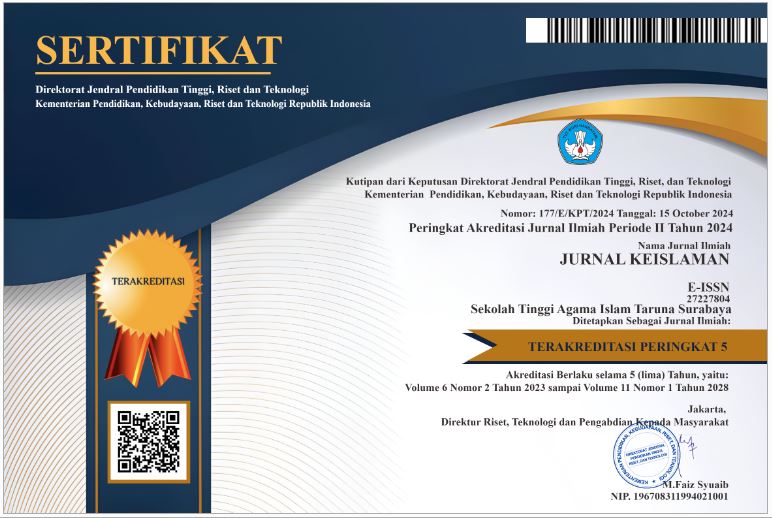Peranan Media Sosial Dalam Peningkatan Motivasi Belajar Siswa Pada Mata Pelajaran PAI di SMK Miftahul Ulum Bandar Lampung
DOI:
https://doi.org/10.54298/jk.v8i1.392Keywords:
student, teacher, children, readingAbstract
The purpose of a study is 1) to analyze the role of social media in increasing students' learning motivation in Islamic religious education subjects at SMK Miftahul Ulum Bandar Lampung, 2) The most effective type of social media in increasing students' learning motivation in Islamic religious education subjects at SMK Miftahul Ulum Bandar Lampung, 3) The challenges of the role of social media in increasing students' learning motivation in Islamic religious education subjects at SMK Miftahul Ulum Bandar Lampung The type of research used by the researcher is qualitative research using descriptive methods, data collection methods in the form of interviews and documentation, data sources via the principal, teachers, and students. The results of the study are as follows: 1) The role of social media is not only communication but also innovation for teachers and students, 2) The types of social media used are Whatsapp, Instagram and Youtube, the researcher uses whatsapp as a type of social media because SMK Miftahul Ulum is more dominant in the use of these social media, 3) The challenge of the role of social media is to distinguish between fake news and valid news, as a teacher it is wiser to provide guidance and wiser in education about the use of social media and the role of teachers must also keep up with the times so as not to be left behind.
Downloads
References
Akbarudina, Aina Salsabila et al. “Dampak Penggunaan Media Sosial Siswa terhadap Motivasi Belajar : Studi Literatur dalam Konteks Pendidikan”. n.d. 891–900.
Atikah, Aulia. “Peran Media Sosial Dalam Meningkatkan Efektivitas Media Pembelajaran”. 2023 1–8.
Aziz, Abdul. “Tantangan Pendidikan Agama Islam di Era 4.0”. Irje: Jurnal Ilmu Pendidikan. Vol. Volume 2, (n.d.).
Dwistia, Halen et al. “Pemanfaatan Media Sosial Sebagai Media Pembelajaran Pendidikan Agama Islam”. Ar-Rusyd: Jurnal Pendidikan Agama Islam. Vol. 1 No. 2 (2022), h. 81–99. https://doi.org/10.61094/arrusyd.2830-2281.33.
Fahmi, Hidayat et al. “Efektivitas Penggunaan Media Sosial Pada Pembelajaran Pendidikan Agama Islam (PAI) Siswa Kelas XI di SMK N 1 Wonosobo”. Mutiara: Jurnal Penelitian dan Karya Ilmiah. Vol. 2 No. 4 (2024), h. 52–57.
Fitriani, Yuni. “Pemanfaatan Media Sosial Sebagai Media Penyajian Konten Edukasi Atau Pembelajaran Digital”. Journal of Information System, Applied, Management, Accounting and Research. Vol. 5 No. 4 (2021), h. 1006–13. https://doi.org/10.52362/jisamar.v5i4.609.
Jurnal, Khidmat, dan Ilmu Sosial. “Peran Kompetensi Kepribadian Guru PAI dalam Meningkatkan Kualitas Pembelajaran Agama Islam”. Vol. 3 No. 1 (2025), h. 122–28.
Kuswanto, Edi. “Peranan Guru PAI dalam Pendidikan Akhlak di Sekolah”. MUDARRISA: Journal of Islamic Education. Vol. 6 No. 2 (2015), h. 194. https://doi.org/10.18326/mdr.v6i2.764.
Tasik, M. N. M.Rahayu, T.Listiana, L. “No Title Model pembelajaran berbasis media sosial dalam meningkatkan pemahaman konsep agama Islam”. Jurnal Pendidikan Agama Islam. Vol. Vol. 9, No (2021), h. 15–27.
Zahroh, Fatimatuz. “Pengaruh Penggunaan Media Sosial Whatsapp Terhadap Motivasi Belajar Siswa kelas IV SDN Pakong 1 Pamekasan masa pandemi Covid-19”. Jurnal Pendidikan Guru Sekolah Dasar. Vol. 2 No. 1 (2021), h. 12–21. tersedia pada https://ejurnal.unisap.ac.id/index.php/edukasitematik/article/view/92 (2021).
Downloads
Published
How to Cite
Issue
Section
License
Copyright (c) 2025 Siti Maimunah, Muhammad Saidun Anwar, Irhamudin

This work is licensed under a Creative Commons Attribution-ShareAlike 4.0 International License.
Authors who publish with this journal agree to the following terms:
- Authors retain copyright and grant the journal right of first publication with the work simultaneously licensed under a Creative Commons Attribution-ShareAlike 4.0 that allows others to share the work with an acknowledgement of the work's authorship and initial publication in this journal.
- Authors are able to enter into separate, additional contractual arrangements for the non-exclusive distribution of the journal's published version of the work (e.g., post it to an institutional repository or publish it in a book), with an acknowledgement of its initial publication in this journal.
- Authors are permitted and encouraged to post their work online (e.g., in institutional repositories or on their website) prior to and during the submission process, as it can lead to productive exchanges, as well as earlier and greater citation of published work (See The Effect of Open Access).


















